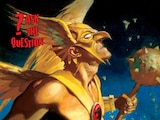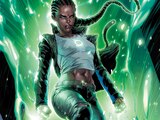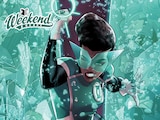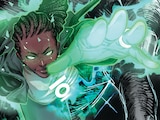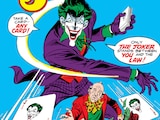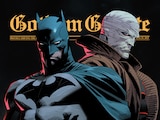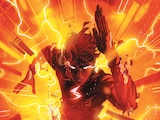While the colorful villains may be what many people associate with Gotham, the show’s heart is embodied by one man: Jim Gordon. A good cop trying—and failing—to keep his conscious clean in a city in which the good guys only win by being bad, it’s Jim Gordon that makes an often over-the-top show like Gotham relatable. It’s his story in which we find the message beneath the show’s madness. We might not be able to relate to a green-suited evil genius who holds the city hostage through riddles or a fear-obsessed child of a doctor who terrorizes people while wearing a burlap mask, but we can sure relate to a man trying to avoid losing hope as the world around him seems to be getting worse by the day. We know exactly what it feels like to discover that the road to success may mean compromising our ideals and beliefs.
“There’s always been a sadness to Gordon,” actor Ben McKenzie said recently. “You see it as commissioner when he’s barely holding it together and in desperate need of Batman to keep the city from falling apart. When he first comes in, he’s much more idealistic. What I like is to watch the world beat him down and knock him to shreds, and have to get up in the morning and pick himself up every day. That’s what I always liked about him, and that’s what Bruno Heller and I always bonded over—this everyman hero keeping the wolves at bay as best he can until ultimately they need a guy dressed as a bat to save them.”
Last week’s episode marked something of a turning point for Gordon, culminating in a brutal confrontation between the newly anointed captain of the GCPD and the woman who anointed him, the cold-and-calculating Sofia Falcone, that left Gordon injured and Falcone dead. As he recovered, Gordon’s often estranged friend and partner Harvey Bullock squelched Jim’s plans to reveal that he was indirectly responsible for Falcone’s rise and Professor Pyg’s earlier killing spree, insisting that the cops who worked under Jim needed their hero untarnished and that Gordon’s guilt was his to bear alone. It was a surprising statement and a direct inverse of Batman’s decision at the end of The Dark Knight, but it makes perfect sense. Gordon operates within the system. It’s only Batman, who doesn’t yet exist, who finally realizes that to be effective in Gotham requires working outside of it.
“Gordon’s a noirish detective,” McKenzie suggests. “He’s always making mistakes. He doesn’t have the full information, but he’s the smartest guy in the room, and when things culminate with the villain, he’s going to figure out how to get his way out of it. But each time he does it, he pays another price and gets beaten down.”
Tonight’s episode, “One of My Three Soups,” is a very Gordon-centric episode, and one of the strongest episodes of what’s arguably Gotham’s strongest season so far. Perhaps uncoincidentally, it was also directed by the man who knows the character better than anyone else: McKenzie. “One of My Three Soups” finds Gordon and Bullock attempting to stop a recently escaped Mad Hatter from killing thousands of people, while also offering some of the deepest insight yet into the background of Jerome Velaska, the popular recurring villain who may or may not be the Joker. (And as if Jerome and Mad Hatter weren’t exciting enough, the Scarecrow makes a pretty sweet return in it as well.)
With some of Gotham’s most dangerous villains returning to action, Gordon will once again find himself tested. Of course, he’ll rise to the occasion—that’s part of who Jim Gordon is. But with everything that’s happened since he became captain, we’re now witnessing a damaged hero try to regain his way. It’s a compelling journey, and it’s unclear at the moment where it’ll take him or if he’ll have to make the journey alone. Currently, things with his best friend Harvey are a little less than great.
“Gordon arguably has done worse than we’ve ever seen Bullock do onscreen,” McKenzie reminds us. “Harvey knows what Jim has done, more or less. Almost all of it. So, there’s a sort of brotherhood of the dirty. They know each other’s baggage and what skeletons they have in their closets. They’re more true peers now, as opposed to Jim having some sort of moral authority over Harvey. That doesn’t mean that Jim doesn’t keep striving, and it doesn’t mean that Harvey doesn’t keep going, ‘Eh, do you really want to fight this?’ But their understanding is a little different.”
As Gordon is feeling more uncertain than he ever has before, he’ll be forced to confront the newly escaped Jerome Velaska, a villain who revels in that sort of chaos—someone who would probably find the idea of one of the most honest people in Gotham being forced to lie to everyone in his life to hold onto his good reputation absolutely hilarious. Jerome has a plan to either control or destroy Gotham that will play out over the rest of the season. However, before he can get to it, Jerome finds himself unexpectedly confronting his past when he’s reunited with an abusive uncle. It doesn’t go how you’d expect, and also manages to paint the escaped psychopath in a sympathetic light.
“I think the more interesting exploration of is to push things as sympathetic as you can and to see what people react to,” shares McKenzie. “They know Jerome’s a psychopath. They know he’s a villain. There’s that old saying that ‘hurt people hurt people.’ Well, here’s a good example. Jerome was tortured brutally by his uncle, and yet, the way that he has chosen to handle that is to push that pain out at everybody else. Does that make what he’s doing right? Of course not, but we can understand him a little better.”
It’s this world of damaged heroes and sympathetic, often appealing villains that has always made the world of Batman stand out in comics, film and TV, and Gotham, even without its eventual Dark Knight, is no different. The city is all shades of grey, both metaphorically and often literally. As Carmine Falcone so perfectly said earlier this season, “The sun never shines here.”
As McKenzie puts it, “This is not a sanitized world where everyone always survives and the only people who get killed are people running from the huge superhero monster or whatever down the streets of Gotham. People are dying brutal ways all the time, and it’s just our way of reminding the audience of the tone of the show.”
Over four seasons, we’ve seen what Gotham does even to the best people. Death and destruction are the norm, corruption is everywhere and the bad guys are winning. It doesn’t take a lot to feel that way about our world as well—heck, all you really need to do is check the news. You’re bound to find something you think is awful. But what’s great about Gotham, and one of the reasons a dark show like this can continue to be such good escapism, is that we know that there’s cause for hope for the people of the city. We know that Batman’s coming, even if the characters don’t.
While shows like Supergirl, The Flash and Black Lightning give us a hero to serve as inspiration, Gotham’s approach has always been different. It shows us a world at its darkest, and given us a severely compromised hero, ultimately to demonstrate that even when things are at their worst, we should never give up hope. On Gotham, we know it’ll be Batman. In our own world and lives, only time will tell.
"One of My Three Soups," directed by Ben McKenzie, airs tonight on Gotham at 8 p.m. (7 p.m. CST) on FOX.





